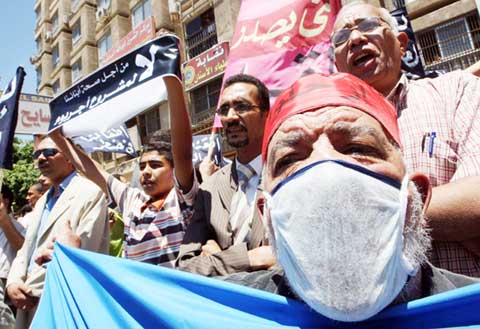
Protests continue in the Damietta area after a man was killed yesterday and several injured in clashes with military forces triying to disperse popular protests against a fertilizer factory in the area.
Citizens have been blocking roads to protest against the nitrogen plant. The plant is jointly owned by state-run Misr Oil Processing Company (MOPCO) and Canadian firm Agrium.
Early this year Prime Minister Essam Sharaf formed a committee to investigate the environmental safetly of the plant in the face of ongoing protests. The protests escalated during Eid al-Adha when a report indicating that the plant's emissions have been causing disease and endangering resources was leaked to the public.
Damietta Security Chief Tareq Hammad spoke to Al-Masry Al-Youm about the current security situation. He distanced the police from the clashes, which primarily involved army forces, while claiming the crisis is of a political nature rather than a security one.
Al-Masry Al-Youm: What do you think is the reason for the crisis?
Tareq Hammad: The crisis started months ago when protests were staged against the plant. It deepened after the committee’s recommendations were leaked to citizens.
Al-Masry: Do you believe "hidden hands" seeking escalation were behind this?
Hammad: I cannot confirm this. Public interest presses everyone against the danger that citizens feel about the plant's existence.
Al-Masry: How about the injured citizens?
Hammad: Most injuries resulted from using tear-gas to disperse protesters. Some suffocated due to clashes.
Al-Masry: Will security forces intervene to end the protest?
Hammad: Solutions proposed by the citizens still suggest settling the crisis through convening with citizens and convincing them to end the protest after their demands are met. A security solution has not yet been proposed.
Al-Masry: How about the losses that resulted from blocking the roads?
Hammad: Strategic goods are still being kept inside the harbor, which is a big crisis that causes heavy losses. In addition, Ras al-Barr citizens suffered an oil shortage. Hospitals stopped working. Everyone was harmed.




